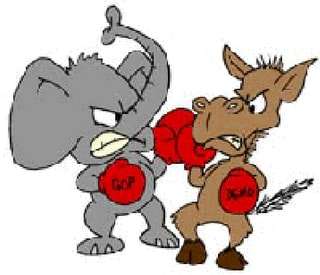The Volokh Conspiracy
Mostly law professors | Sometimes contrarian | Often libertarian | Always independent
The perils of partisan bias

In a fascinating recent op ed, longtime conservative talk show host Charlie Sykes discusses how partisan bias led many of his fellow conservatives to overlook Donald Trump's flaws, and even turn on anyone who insisted on pointing them out:
[R]elatively few of my listeners bought into the crude nativism Mr. Trump was selling at his rallies.
What they did buy into was the argument that this was a "binary choice." No matter how bad Mr. Trump was, my listeners argued, he could not possibly be as bad as Mrs. Clinton. You simply cannot overstate this as a factor in the final outcome. As our politics have become more polarized, the essential loyalties shift from ideas, to parties, to tribes, to individuals. Nothing else ultimately matters….
In this binary tribal world, where everything is at stake, everything is in play, there is no room for quibbles about character, or truth, or principles. If everything - the Supreme Court, the fate of Western civilization, the survival of the planet - depends on tribal victory, then neither individuals nor ideas can be determinative…
In this political universe, voters accept that they must tolerate bizarre behavior, dishonesty, crudity and cruelty, because the other side is always worse; the stakes are such that no qualms can get in the way of the greater cause….
Even among Republicans who had no illusions about Mr. Trump's character or judgment, the demands of that tribal loyalty took precedence. To resist was an act of betrayal.
Partisan hatred of the opposition also made many conservatives susceptible to dubious "fake news" stories and conspiracy theories:
For many listeners, nothing was worse than Hillary Clinton. Two decades of vilification had taken their toll: Listeners whom I knew to be decent, thoughtful individuals began forwarding stories with conspiracy theories about President Obama and Mrs. Clinton - that he was a secret Muslim, that she ran a child sex ring out of a pizza parlor. When I tried to point out that such stories were demonstrably false, they generally refused to accept evidence that came from outside their bubble. The echo chamber had morphed into a full-blown alternate reality silo of conspiracy theories, fake news and propaganda.
The situation described by Sykes is part of the more general phenomenon of partisan bias in evaluating political information. That bias has grown worse as the parties have become more polarized, and both Democrats and Republicans feel increasing hatred and intolerance for the opposing party and its supporters. This has increased pressure to support your own partisan team, to vilify the opposition, and to avoid doing anything that might potentially help the partisan enemy.
During the 2016 election, these problems have been particularly evident in the GOP. But Democrats, too, are susceptible to the same phenomenon. Like Republicans, many Democratic voters are prone to embrace conspiracy theories that reinforce their preexisting views about the evil nature of their enemies; widespread support for 9/11 "trutherism" is the Democratic counterpart to GOP "birtherism." Democrats also often excuse behavior by their own leaders that they would not tolerate if a Republican did the same thing. Both Democratic and Republican partisans routinely engage in "motivated reasoning" that skews their perceptions of reality.
The ultimate result is that partisans on both sides end up defending the indefensible, dismissing legitimate issues raised by the opposition, and adopting dubious beliefs based on deception and misinformation. "Fake news" and other forms of political deception flourish in large part because they feed into preexisting biases. Few are so blind as partisans who only want to see that which reinforces their preexisting biases. The overall quality of political discourse and public policy thereby becomes worse than it otherwise might be.
Much of the time, this kind of bias is actually rational behavior on the part of voters. Because there is so little chance that any one vote will influence the outcome of an election, it often makes sense for partisans to evaluate information in a highly biased way, and to reach conclusions that are emotionally satisfying, regardless of whether they are sound or not. Instead of behaving as truth seekers, they act as "political fans" cheering on Team Red or Team Blue. From the standpoint of any individual voter, the psychic benefits of reinforcing partisan biases outweigh the very low cost of getting things wrong.
But rational behavior on the part of individuals can lead to terrible collective outcomes. In this case, it poisons our political discourse, and reduces the quality of government.
There is no easy solution to this problem. It is, ultimately, just one facet of the broader problem of widespread public ignorance and bias about political issues. In my view, the best approach is to limit and decentralize government power, and thereby enable us to make more of our decisions in settings where we have stronger incentives to act as truth-seekers rather than biased fans. But I am open to considering a variety of other potential solutions.
In the meantime, there is much that individual voters can do to make themselves better-informed and less biased. I am not optimistic that very many will actually do so. But even modest improvement might make an incremental difference.


Show Comments (0)